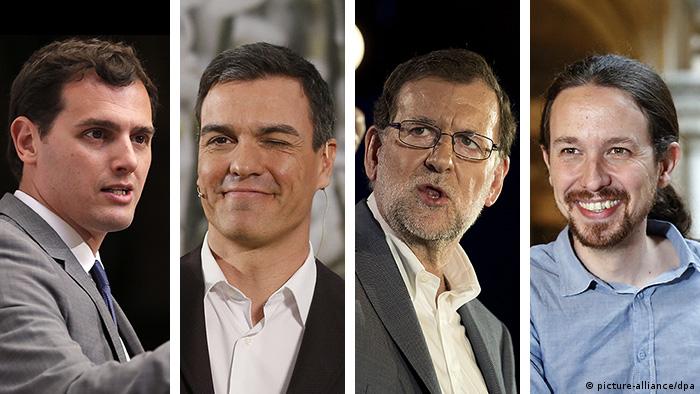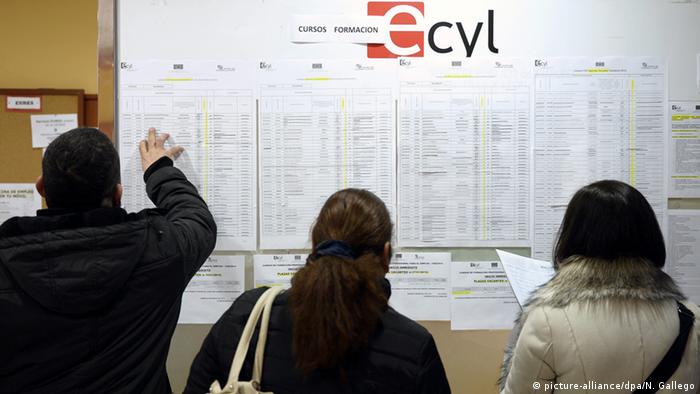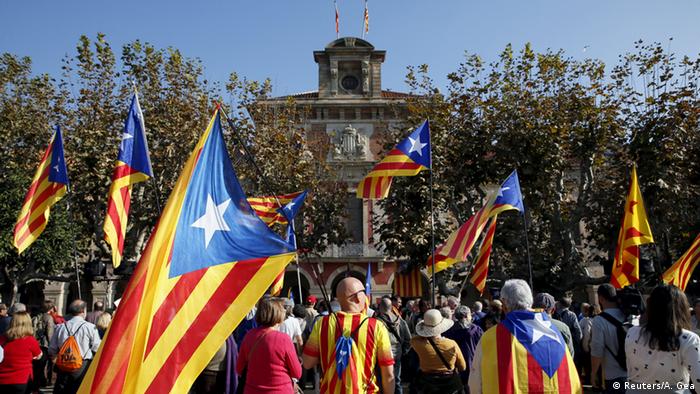Spain
Spain: After the election is before the election
In Spain, a new Parliament is elected. The situation is similarly complex as half a year ago, as the parties could not agree on a coalition. This Time, the formation of a government is difficult.

Top candidates in the parliamentary elections (l. to R.) : Albert Rivera, Pedro Sanchez, Mariano Rajoy, and Pablo Iglesias
It is not to be overlooked: The Spaniards, the politics are tired.
For weeks, the party leaders had negotiated after the parliamentary elections in December 2015, but can’t. A survey by the Institute Metroscopia for the daily El Pais has revealed that only 70 percent of the voters want to cast their ballot. Of the high electoral abstention of the conservative interim could benefit from Prime Minister Mariano Rajoy of the party “Partido Popular” (PP). The supporters of the party are less inclined to abstention than the voters of other parties.
To those who want to give their vote to the PP, even Cristiano. The 82-Year-old is not aware that the demographic Trend has to favor the traditional parties. “The young people seem to want to experiment a little bit,” he says in a DW interview. “But the over 60 Year olds put on order. That’s why you choose the PP.”
Although the government party sees countless cases of corruption, it is still supported by the majority of conservative voters. So, too, of Cristiano. He wants to continue to vote for the PP. “While it is true that the Conservatives have been enriched, but so do all politicians. But if the Communists win, they will travel to Spain in front of the wall.”
Protest against austerity
The “Communists”, says Cristiano, called “Unidos Podemos”. It is a coalition of the parties of the left “Podemos” and the “Izquierda Unida” (United Left), which oppose the austerity measures of the government. The Alliance recorded in the surveys a
rapid recovery and will come in the elections expected to be on the second place.

Left Alliance: Alberto Garzón (L) and Pablo Iglesias will compete in the elections together
“Unidos Podemos” is for the political Establishment is a major threat. However, the leader of the party, Pablo Iglesias, is regarded as arrogant and quick-tempered, and is even among his voters are not popular.
The against a strict austerity-oriented coalition controlled with Madrid, Barcelona and Valencia already, the three largest cities of Spain. Prerequisite alliances with local and regional groups; in addition, she has many followers among the urban, young and educated voters.
“I’m going to vote for Unidos Podemos, even though I can’t imagine Pablo Iglesias as the Spanish Prime Minister. He just looks after that,” says the 55-year-old Flor. She and her husband Leandro came 30 years ago from Argentina to Spain. Since then, she works as a freelance graphic designer in Madrid.
Sympathy with the socialists
Flor and Leandro believe that they are also well-Known for Podemos. “Of course, we are mostly on the left. But none of our friends intend to vote for the socialist party PSOE,” says Flor.
An Acquaintance recently told him, Pedro Sanchez, the Chairman of the PSOE, sorry; that’s why he is considering to vote for him. Of course, that was quite amusing. But Seriously: I belonged to a while ago is still one of the Few that liked Sanchez. But in the meantime, he’s doing just feel sorry for.”

Looking for a job: The high level of unemployment leads to many Spaniards to leave their country
Sanchez PSOE is facing the biggest crisis since decades. For the first Time since Spain in 1978 to democracy took place, not the socialists, according to surveys, among the two parties with the most votes.
Despite the bad poll numbers, the PSOE can hope for favorable circumstances. The national electoral system favors rural regions. There – for example, in Andalusia and Extremadura – hope the socialists, their competition from the left of the rank to expire.
Progressive voters, conservative government
But, regardless of who receives the most votes or seats: it seems Safe to predict that no party or coalition comes only in the vicinity of the 176 seats that are for the formation of a government is necessary. The difficult personal relationship between the three party leaders (Rajoy, Iglesias and Sanchez) as well as the emerging independence process in Catalonia will complicate negotiations considerably, especially among the left parties.
Sanchez has already stated he would not support the formation of a by Rajoy or Iglesias-led government. Iglesias would like to work together with Sanchez, but with the right PP or the new, right-wing liberal party Ciudadanos.
At the same time Ciudadanos-Chef Albert Rivera – his party is likely to achieve according to surveys, around 40 seats – as a hinge between PP and PSOE. His party is in sharp contrast to the Unidos Podemos in favour of a Referendum on the independence of Catalonia. Both parties have there
a strong base.

Demonstration for independence: Catalan nationalists in front of the regional Parliament in Barcelona
Antonio Barroso, Deputy Director of research at Teneo research Institute, London, said in a letter to the company’s customers, the elections would make the formation of a government “hardly easier.” For Barroso, the most likely outcome is tolerated to a PP-led minority government, supported by the Ciudadanos and the PSOE.
The political commentator and author Carlos Santos considers the prospects for a stable majority government for the low – “even if you are given.” In Santos, Barroso stated: “Although the majority of the voters vote for the left, the Chance of a right-wing government.”